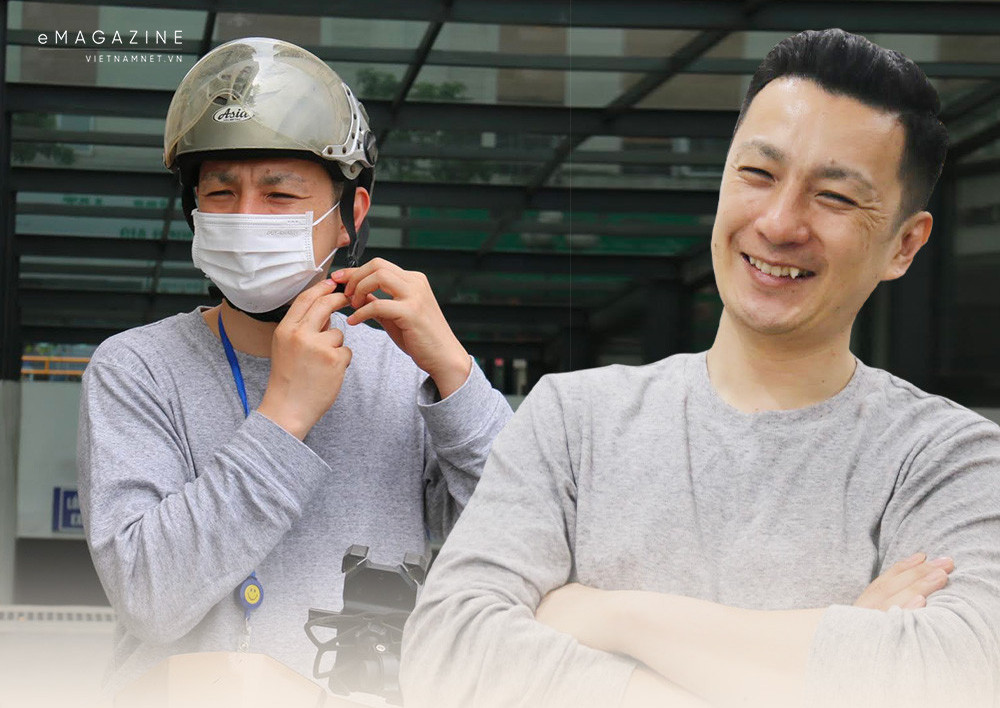
He said Japan is his homeland, and he loves it. But he says that Japanese people live harsh lives and they seem to have forgotten about their happiness.
Manabu was a policeman with an income of VND100 million a month, but he was unhappy.
He decided to come to Vietnam where he lives in a rented house, rides a motorbike to the office, works eight hours a day, and reads books after working hours.
Leaving for Vietnam
When he submitted his resignation letter, Manabu was the head of the Criminal Police Department in Saitama province. He had many things that many Japanese dreamed of – a good job that brought high income, an honourable career, and bright prospects.
When he informed his parents about the decision to leave for Vietnam, his father told him to rethink, while his mother cried and his co-workers advised him against doing it.
However, he still insisted on doing what he had planned.
His first job in Vietnam was working as an interpreter for an IT firm. He was shocked when receiving the salary after the first working month. The pay was just VND20 million, while the house rent alone cost VND14 million.
On the first days in Vietnam, he often went out with his Japanese friends. On weekends, they ate out, went to a karaoke parlour and played golf. All the leisure services were costly and he had to use savings.
Later, he changed his thoughts. His Japanese friends only stayed in Vietnam for a short time. They had two sources of income, including salaries in Japan and in Vietnam. As they had more free time when working in Vietnam than in Japan, they enjoyed leisure services and spent a lot of money before leaving Vietnam for their home country.
But this was not Manabu’s goal. He wanted to live in Vietnam for a long time. If he did not have enough money, he would not have been able to get a visa and would have to return to Japan. So he decided to refuse invitations to parties from his friends.
After two years, he resigned from his job to set up a business in IT with his two friends. One year later, he quit and cooperated with another friend to open a Japanese language center. But the center only lasted half a year.
It was a difficult period for Manabu. But he never thought of returning to Japan, and even became more determined to exist in Vietnam. He studied IT and accountancy and obtained a master’s degree on Vietnam studies.
In March 2019, he was invited to work for a labor export company. At present, he is deputy CEO and headmaster of a Japanese language center belonging to the company.
“The job is good with a satisfactory income. The working environment is good. People are friendly and open hearted,” he said.
Why Vietnam?
“That is the question raised one million times,” he said.
Manabu said he chose to become a policeman simply because his father was also a policeman, and he believed that policemen could help people.
However, he felt as if he had "gone to hell" with the decision. “You will be punished if you are late just 0.1 second. And not only you, but all the classmates will be punished,” he recalled.
The workload was heavy at the police station where he worked after graduation. Every working shift lasted 24-30 hours.
“It is very cold and snowy in winter in Japan. But if you complain you are cold, you will be told that a policeman afraid of cold is not needed,” he said.
Later, he was assigned to work on cases related to Vietnamese expats in Japan. He sometimes met Vietnamese who had committed theft or had illegally emigrated.
In 2011, Manabu arrived in Vietnam for the first time as a traveler. HCM City enchanted him. “This was like love at first sight,” he said.
He loves Vietnamese people’s character. “They are happy and free, and different from Japanese. Vietnam is a country with smiles,” he said.
In 2014, he was sent to a 2-month training course in the Vietnamese language at Hanoi University of Science and Technology. After experiencing the Vietnamese lifestyle, travelling, and trying many delicious dishes and meeting many Vietnamese, he began enjoying the life here and thinking about living in the country.
He returned to Vietnam many times during the next two years, and in 2016, his letter of resignation was put on the table of his senior officer.
Nguyen Thao